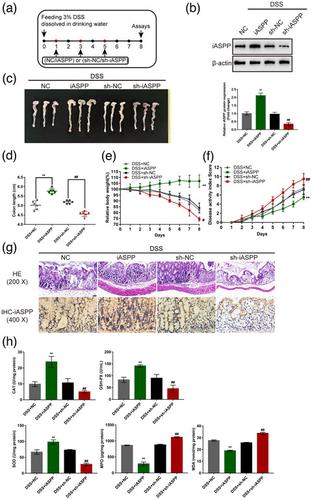当前位置:
X-MOL 学术
›
Clin. Exp. Immunol.
›
论文详情
Our official English website, www.x-mol.net, welcomes your feedback! (Note: you will need to create a separate account there.)
Inhibitor of apoptosis-stimulating p53 protein protects against inflammatory bowel disease in mice models by inhibiting the nuclear factor kappa B signaling
Clinical & Experimental Immunology ( IF 4.6 ) Pub Date : 2021-05-03 , DOI: 10.1111/cei.13613 Ke Qian 1, 2 , Lianwen Yuan 3 , Shalong Wang 3 , Yong Kuang 1 , Qianqian Jin 1 , Dongju Long 1 , Yuhong Jiang 1 , Hua Zhao 1 , Kuijie Liu 1 , Hongliang Yao 1
Clinical & Experimental Immunology ( IF 4.6 ) Pub Date : 2021-05-03 , DOI: 10.1111/cei.13613 Ke Qian 1, 2 , Lianwen Yuan 3 , Shalong Wang 3 , Yong Kuang 1 , Qianqian Jin 1 , Dongju Long 1 , Yuhong Jiang 1 , Hua Zhao 1 , Kuijie Liu 1 , Hongliang Yao 1
Affiliation

|
Drugs and therapies available for the treatment of inflammatory bowel disease (IBD) are not satisfactory. Our previous study has established the inhibitor of apoptosis-stimulating p53 protein (iASPP) as an oncogenic regulator in colorectal cancer by forming a regulatory axis or feedback loop with miR-124, p53, or p63. As iASPP could target and inhibit nuclear factor kappa B (NF-κB) activation, in this study the role and mechanism of iASPP in IBD was investigated. The aberrant up-regulation of iASPP in IBD was subsequently confirmed, based on online data sets, clinical sample examinations and 2,4,6-trinitrobenzene sulfonic acid (TNBS)- and dextran sulfate sodium (DSS)-induced colitis mice models. TNBS or DSS stimulation successfully induced colon shortness, body weight loss, mice colon oxidative stress and inflammation. In both types of colitis mice models, iASPP over-expression improved, whereas iASPP knockdown aggravated TNBS or DSS stimulation-caused colon shortness, body weight loss and mice colon oxidative stress and inflammation. Meanwhile, in both types of colitis mice models, iASPP over-expression inhibited p65 phosphorylation and decreased the levels of tumor necrosis factor (TNF)-α, interleukin (IL)-1β, IL-6, C-X-C motif chemokine ligand (CXCL)1 and CXCL2 in mice colons, whereas iASPP knockdown exerted opposite effects.
中文翻译:

凋亡刺激 p53 蛋白抑制剂通过抑制核因子 kappa B 信号传导保护小鼠模型免受炎症性肠病
可用于治疗炎症性肠病 (IBD) 的药物和疗法并不令人满意。我们之前的研究通过与 miR-124、p53 或 p63 形成调节轴或反馈环,确定了凋亡刺激 p53 蛋白 (iASPP) 抑制剂作为结直肠癌的致癌调节剂。由于 iASPP 可以靶向和抑制核因子 kappa B (NF-κB) 的激活,本研究研究了 iASPP 在 IBD 中的作用和机制。随后,基于在线数据集、临床样本检查和 2,4,6-三硝基苯磺酸 (TNBS) 和葡聚糖硫酸钠 (DSS) 诱导的结肠炎小鼠模型,证实了 IBD 中 iASPP 的异常上调。TNBS 或 DSS 刺激成功地诱导了结肠短促、体重减轻、小鼠结肠氧化应激和炎症。在两种类型的结肠炎小鼠模型中,iASPP 过表达得到改善,而 iASPP 敲低加重了 TNBS 或 DSS 刺激引起的结肠短小、体重减轻和小鼠结肠氧化应激和炎症。同时,在两种结肠炎小鼠模型中,iASPP 过表达抑制 p65 磷酸化并降低肿瘤坏死因子 (TNF)-α、白细胞介素 (IL)-1β、IL-6、CXC 基序趋化因子配体 (CXCL)1 的水平和 CXCL2 在小鼠结肠中,而 iASPP 敲低产生相反的效果。
更新日期:2021-07-12
中文翻译:

凋亡刺激 p53 蛋白抑制剂通过抑制核因子 kappa B 信号传导保护小鼠模型免受炎症性肠病
可用于治疗炎症性肠病 (IBD) 的药物和疗法并不令人满意。我们之前的研究通过与 miR-124、p53 或 p63 形成调节轴或反馈环,确定了凋亡刺激 p53 蛋白 (iASPP) 抑制剂作为结直肠癌的致癌调节剂。由于 iASPP 可以靶向和抑制核因子 kappa B (NF-κB) 的激活,本研究研究了 iASPP 在 IBD 中的作用和机制。随后,基于在线数据集、临床样本检查和 2,4,6-三硝基苯磺酸 (TNBS) 和葡聚糖硫酸钠 (DSS) 诱导的结肠炎小鼠模型,证实了 IBD 中 iASPP 的异常上调。TNBS 或 DSS 刺激成功地诱导了结肠短促、体重减轻、小鼠结肠氧化应激和炎症。在两种类型的结肠炎小鼠模型中,iASPP 过表达得到改善,而 iASPP 敲低加重了 TNBS 或 DSS 刺激引起的结肠短小、体重减轻和小鼠结肠氧化应激和炎症。同时,在两种结肠炎小鼠模型中,iASPP 过表达抑制 p65 磷酸化并降低肿瘤坏死因子 (TNF)-α、白细胞介素 (IL)-1β、IL-6、CXC 基序趋化因子配体 (CXCL)1 的水平和 CXCL2 在小鼠结肠中,而 iASPP 敲低产生相反的效果。



























 京公网安备 11010802027423号
京公网安备 11010802027423号